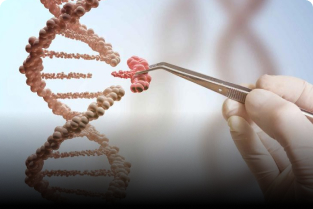Nanotechnology and genetic engineering are two of the most dynamic and interdisciplinary fields in science and technology. If you have completed your B.Tech in Genetic Engineering, you may wonder if pursuing an M.Tech in Nanotechnology is a feasible and rewarding option. The answer is a resounding yes, and here’s why.
Understanding the Interconnection Between Genetic Engineering and Nanotechnology
Genetic engineering focuses on manipulating genes to achieve desired traits in organisms, whether for medical, agricultural, or industrial purposes. Nanotechnology, on the other hand, involves working with materials at the atomic or molecular level to create new applications in fields such as medicine, electronics, and environmental science.
The overlap between these fields is significant. For instance:
- Nano-biotechnology: The application of nanotechnology in biology and medicine, such as drug delivery systems, nanobiosensors, and tissue engineering.
- Molecular-level Manipulations: Both fields operate at microscopic levels, making it easier for someone with a genetic engineering background to grasp nanotechnology concepts.
- Interdisciplinary Research: Many research areas, like DNA nanotechnology or CRISPR-based nanodevices, require expertise in both domains.
Eligibility Criteria for M.Tech in Nanotechnology
Most universities and institutions offering M.Tech in Nanotechnology have broad eligibility criteria. Typically, candidates with a background in engineering, physics, chemistry, biotechnology, or related fields can apply. A B.Tech in Genetic Engineering is often considered a relevant qualification since it provides foundational knowledge in biology and molecular sciences, which are integral to nanotechnology.
To ensure eligibility:
- Check Specific Requirements: Review the admission guidelines of the institutions you are interested in. Some may require you to have studied specific subjects or have a minimum CGPA.
- Qualify Entrance Exams: Many programs require candidates to clear national-level exams like GATE (Graduate Aptitude Test in Engineering). Check if your B.Tech specialization aligns with the eligibility criteria for the exam.
Advantages of Pursuing M.Tech in Nanotechnology After Genetic Engineering
- Diverse Career Opportunities: Combining genetic engineering and nanotechnology opens up avenues in industries like healthcare, pharmaceuticals, environmental technology, and agriculture.
- Example: Developing nano-based drug delivery systems or designing biosensors for early disease detection.
- Research and Development: Interdisciplinary skills are highly valued in R&D roles. With expertise in both fields, you can contribute to groundbreaking innovations.
- Higher Demand: Nanotechnology is a rapidly growing field with increasing demand for skilled professionals, especially in areas like personalized medicine and sustainable technologies.
- Broader Skill Set: An M.Tech in Nanotechnology equips you with skills in nanofabrication, characterization techniques, and material science, complementing your genetic engineering background.
Challenges to Consider
- Steep Learning Curve: Transitioning from genetic engineering to nanotechnology may require additional effort to understand concepts in physics and material science.
- Specialized Focus: Ensure you choose a program that aligns with your interests, such as biomedical nanotechnology, to make the most of your background.
- Limited Seats: M.Tech programs in nanotechnology are highly competitive, so thorough preparation is crucial.
How to Prepare for the Transition
- Strengthen Core Knowledge: Brush up on fundamental concepts in physics, chemistry, and material science.
- Take Online Courses: Platforms like Coursera and edX offer introductory courses in nanotechnology and related fields.
- Research Institutes: Identify institutions known for nanotechnology research and understand their focus areas.
- Build a Portfolio: Highlight projects, internships, or research work from your B.Tech that demonstrates your interest in nanotechnology.
Conclusion
Pursuing an M.Tech in Nanotechnology after a B.Tech in Genetic Engineering is not only possible but also highly advantageous for those interested in interdisciplinary fields. With the right preparation and a clear focus on your career goals, you can leverage the synergy between these domains to make significant contributions to science and technology. Whether you aim to innovate in medicine, develop sustainable technologies, or explore the frontiers of molecular science, this combination offers a promising pathway.

